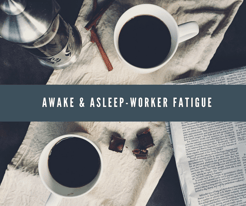 employee Work Fatigue
employee Work Fatigue
“When people sleep less than five hours a night, on a regular basis, it doubles mortality,” said Dr. Michael J. Breus, PhD, a clinical psychologist and board-certified sleep specialist. Several reasons including too little, poor quality or interrupted sleep over a period of time can lead to worker fatigue which increases the risk for illnesses and injuries. The truth is – planning to be awake to implement a fatigue risk management plan only works if you plan to be asleep long enough to flourish your own safety and health. Ready to snooze? Wrong! “A well-spent day brings happy sleep.”
Work. Sleep. Repeat.
Do you miss the days of your well-spent youth when you slept more than 10 hours per day? Me neither! Seriously folks – what could we possibly accomplish if we committed more time to being asleep? That’s right – everything! A restful night means everything when it comes to your health (and safety) at home and at work. A lack of sleep can lead to work fatigue which leads to incidents (e.g. oil refinery explosions and errors in patient care). According to OSHA, “Long work hours and extended and irregular shifts may lead to fatigue and to physical and mental stress.” Our adult life involves working, sleeping, and repeating. Why not complete the cycle healthier? The responsibility to take care of ourselves is more important than the responsibilities that come due, every month, like clockwork. This notion of “I’ll sleep when I’m dead” is for the birds.
Birds of Circadian Rhythms
The National Sleep Foundation says, “Your circadian rhythm is basically a 24-hour internal clock that is running in the background of your brain and cycles between sleepiness and alertness at regular intervals.” We have patterns. When it comes to sleep patterns, some people are “larks” or “owls” while others are “hummingbirds.”
|
Lark |
Early riser; Most productive in the morning. |
No alarm clock necessary to wake you up. |
Get increasingly drowsy in the early evenings. |
|
Owl |
Morning struggler; Pick up as the day progresses. |
An alarm clock, and perhaps a backup is needed. |
You don’t want to go to bed sooner than 2:00 AM. |
|
Hummingbird |
You fall in between both a lark and an owl. |
You are ready for action both early and late. |
You can easily shift your wake and sleep times. |
The majority of the population are hummingbirds, including myself; but, I lean more towards a hummingbird that flies with owls. Workers are duty bound to be at their intellectual and physical best during a work shift. The safety of yourself, your co-workers, and the pubic is at extreme risk if you are not getting a healthy amount of sleep each night. So, no matter which sleep pattern you follow – it must include at least 8 hours of sleep. Check out Your Guide to Health Sleep from the U.S. Department of Health and Human Services.
Rise and Shine
It’s not only night shift workers who find it difficult to stay awake at work. Numerous traits of your health and quality of life are connected to sleep, and these traits are impaired when you are sleep deprived. Most people report being irritable, if not downright depressed, when they lack sleep. Being very tired makes it hard to concentrate, which increases the likelihood of errors or incidents. OSHA states the following are “several ways that workers and employers can help reduce the hazards of worker fatigue.”
Employers
Examine staffing issues- Arrange schedules to allow opportunities for nighttime sleep
- Adjust the work environment to increase alertness
- Provide worker education and training
Workers
- Sleep 7-9 hours without disruptions
- Try to sleep at the same time every day
- Adjust the sleep environment – should be comfortable, cool, dark and quiet
- Evening or night shift – sleep within the last 8 hours before going to work
Tomorrow
Tonight, you’re going to sleep between 7 and 9 hours. Tomorrow, you’re going to start planning your fatigue risk management plan. Are you paying attention or did I lose you? The plan starts with management commitment. Outside experts, including our safety professionals, will offer your plan the chance to be most effective for your organization. Make it happen! Help your employees fight the effects of work fatigue! Always get a good night’s sleep and approach every day wide awake and ready to change the world.

















